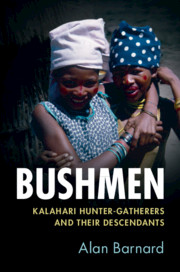Book contents
- Bushmen
- Bushmen
- Copyright page
- Contents
- Figures
- Tables
- Preface
- Pronunciation and Orthography
- 1 Bushmen
- 2 The Politics of Indigeneity
- 3 How Far Back Can We Go?
- 4 Discovery and Destruction of the /Xam
- 5 The !Xoõ and Their Neighbours
- 6 G/wi, G//ana and the Central Kalahari
- 7 Naro
- 8 Ju/’hoansi or !Kung
- 9 Hai//om
- 10 Bushmen of the Okavango
- 11 Sharing the Land with Others
- 12 Conclusions
- References
- Index
- References
1 - Bushmen
Unity and Diversity
Published online by Cambridge University Press: 11 July 2019
- Bushmen
- Bushmen
- Copyright page
- Contents
- Figures
- Tables
- Preface
- Pronunciation and Orthography
- 1 Bushmen
- 2 The Politics of Indigeneity
- 3 How Far Back Can We Go?
- 4 Discovery and Destruction of the /Xam
- 5 The !Xoõ and Their Neighbours
- 6 G/wi, G//ana and the Central Kalahari
- 7 Naro
- 8 Ju/’hoansi or !Kung
- 9 Hai//om
- 10 Bushmen of the Okavango
- 11 Sharing the Land with Others
- 12 Conclusions
- References
- Index
- References
Summary
Bushmen’ or ‘San’ are not one ethnic group. They are several, speaking a diversity of languages, having many different settlement patterns and kinship systems, and even possessing a variety of economic practices. Yet we think of them as a unity. This is not as strange as it may seem, for all such groups share a common origin as an original hunting-and-gathering population (or populations) of southern Africa. Diversity includes biological difference, linguistic affiliation and so on. Even what we call them reflects a kind of diversity. Many experts, especially in archaeology, call them ‘San’, a term derived from the word saan or sān (common gender plural) in Khoekhoe dialects. It occurs in no Bushman or San language, whereas other experts prefer to use Bushmen or Basarwa, and a few have used Kua or even N/uakhoe (literally, ‘red people’). Kua is the preferred generic term in a few languages, and Red People is a fairly common self-description in some. Etymologically though, each of these terms is problematic. This introductory chapter will explore these issues and look forward to general themes in the book.
- Type
- Chapter
- Information
- BushmenKalahari Hunter-Gatherers and Their Descendants, pp. 1 - 17Publisher: Cambridge University PressPrint publication year: 2019



